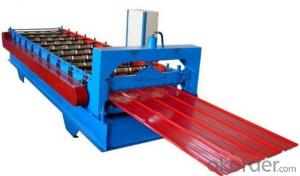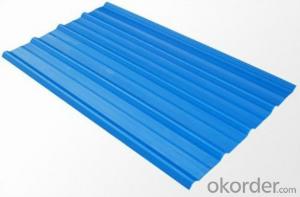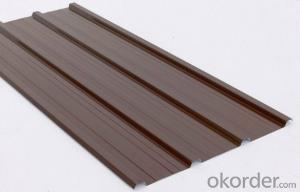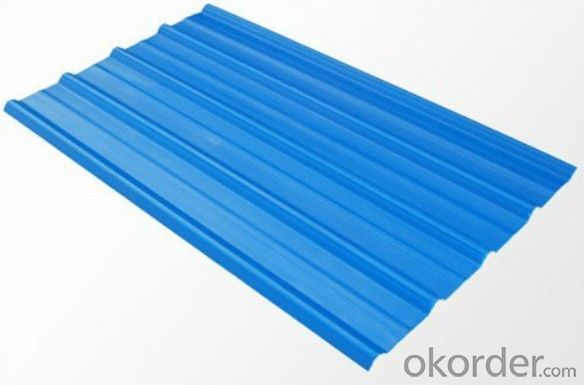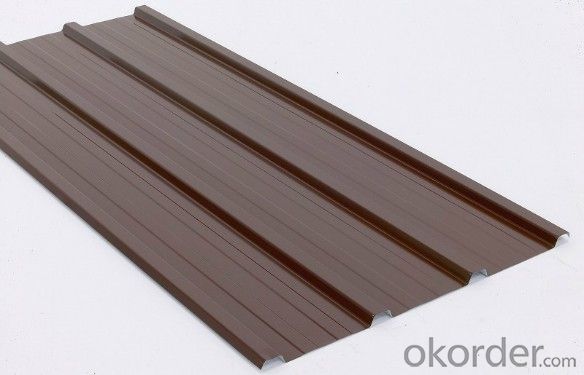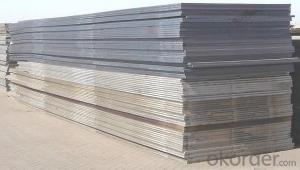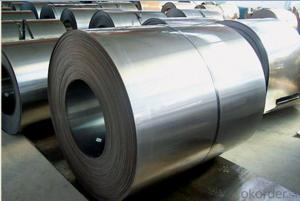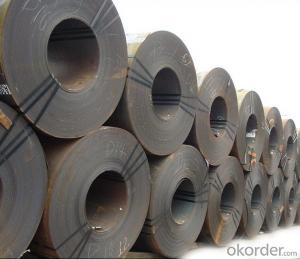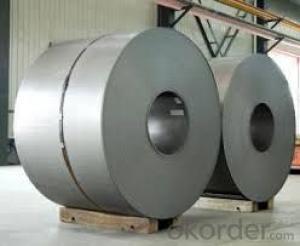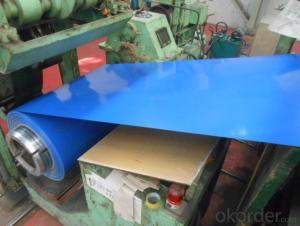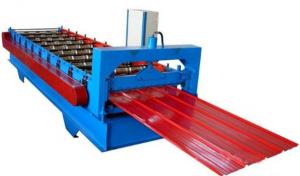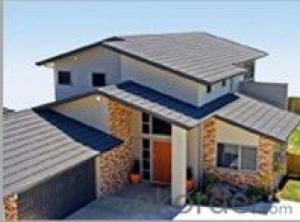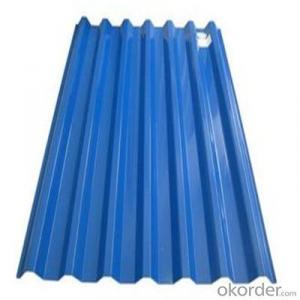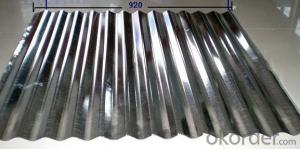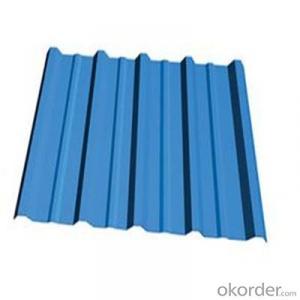Prepainted Galvanised Corrugated Sheets
- Loading Port:
- China Main Port
- Payment Terms:
- TT OR LC
- Min Order Qty:
- -
- Supply Capability:
- -
OKorder Service Pledge
OKorder Financial Service
You Might Also Like
Product Description:
We specialize in manufacturing galvanized steel coil, galvalume steel coil, prepainted steel coil and galvanized corrugated sheets.
Nowadays our company has grown up to a collectivized company . We are grateful to the cooperation partner who`s grown with us all the way. We hope we could make more friends from all over the world. Under the joint efforts of both sides we believe that we will continue to achieve win-win results based on mutual trust and mutual support.
Quick Details
| Standard: | Grade: | Thickness: | |||
| Place of Origin: | Brand Name: | Model Number: | |||
| Type: | Technique: | Surface Treatment: | |||
| Application: | Special Use: | Width: | |||
| Length: | Based Material: | Material: | |||
| Zinc Coated: | Spangle: | Shape: | |||
| Galvanized Type: | Business: | Payment Terms: | |||
| Packaging: | Delivery Detail: |
Packaging & Delivery
| Packaging Detail: | Fully seaworthy export packing with paper tube Each coil is wrapped in water-proof paper. |
| Delivery Detail: | about 15 days after the deposit if the quantity below 500 ton. |
Specifications
Corrugated gi/gl/ppgi Sheet
1.Thickness: 0.13mm-1.0mm
2.Width:750mm-1250mm
3. z40-z150g/m2
4.ISO 2000,SGS
- Q: Can steel sheets be used in acidic environments?
- Yes, steel sheets can be used in acidic environments but it is important to choose the appropriate type of steel and take certain precautions. Stainless steel, particularly grades with high levels of chromium and nickel, is highly resistant to corrosion and can withstand acidic environments. These types of steel sheets form a passive protective layer on their surface when exposed to oxygen, which prevents further corrosion. However, not all types of steel are suitable for acidic environments. Carbon steel, for example, is prone to corrosion in acidic conditions and would not be recommended for such applications. Additionally, the concentration and temperature of the acid can also affect the performance of steel sheets. To ensure the best performance in acidic environments, it is advisable to consult with steel suppliers or corrosion engineers who can recommend the most appropriate type of steel for specific conditions. It is also important to regularly monitor and maintain the steel sheets to prevent any potential damage or corrosion.
- Q: Can steel sheets be used for electrical grounding purposes?
- Yes, steel sheets can be used for electrical grounding purposes. Steel is a good conductor of electricity, which makes it suitable for grounding applications. When properly connected to an electrical system, steel sheets can provide an effective path for the dissipation of electrical charges and prevention of electrical shock hazards. However, it is important to ensure that the steel sheets are adequately bonded and connected to the grounding system in order to create a low-resistance path for fault currents. Additionally, factors such as the thickness and surface area of the steel sheets should be considered to ensure they meet the requirements for effective grounding.
- Q: Can steel sheets be painted or coated?
- Yes, steel sheets can be painted or coated.
- Q: Can steel sheets be used in high-temperature applications?
- Yes, steel sheets can be used in high-temperature applications. Steel is known for its excellent heat resistance and can withstand high temperatures without losing its structural integrity. The specific type of steel and its composition play a crucial role in determining its suitability for high-temperature applications. Certain types of steel, such as stainless steel or heat-resistant steel, are specifically designed to withstand extremely high temperatures and are commonly used in industries such as aerospace, automotive, and manufacturing. These steel sheets can be utilized in various high-temperature environments, including furnaces, boilers, exhaust systems, and heat exchangers, among others. However, it is important to consider factors such as the specific temperature range, duration of exposure, and any potential corrosive elements present in the high-temperature environment to ensure that the chosen steel sheet is appropriate for the application.
- Q: What is the shelf life of steel sheets?
- The shelf life of steel sheets is typically considered to be indefinite. Unlike perishable goods, steel sheets do not have an expiration date or a limited lifespan. Properly stored and maintained steel sheets can remain in good condition for many years, if not decades, without any significant degradation. However, exposure to certain environmental factors such as moisture, extreme temperatures, and corrosive substances can affect the quality and durability of steel sheets over time. Therefore, it is recommended to store steel sheets in a dry and controlled environment to ensure their longevity and prevent any potential damage or deterioration.
- Q: Can steel sheets be used for roofing purposes?
- Yes, steel sheets can be used for roofing purposes. Steel is a durable and long-lasting material that is resistant to corrosion, making it an excellent choice for roofing. Steel sheets provide strength and stability to the roof, protecting the building from various weather conditions. Additionally, steel roofs are low maintenance and can be energy-efficient if properly insulated.
- Q: Are steel sheets resistant to warping or bending?
- Yes, steel sheets are known for their high resistance to warping or bending due to their strong and rigid nature.
- Q: Can steel sheets be used for manufacturing musical instruments?
- Yes, steel sheets can be used for manufacturing musical instruments. Steel is a versatile material that can be shaped and tuned to produce various sounds. It is commonly used in instruments like steel guitars, steel drums, and some percussion instruments.
- Q: Can the steel sheets be easily cleaned?
- Yes, steel sheets can be easily cleaned. Steel is known for its durability and ease of maintenance. It can be wiped clean using a damp cloth or sponge with mild soap or detergent. For tougher stains or grime, a non-abrasive cleaner can be used. Additionally, steel sheets are resistant to rust and corrosion, making them suitable for various environments and easy to maintain in the long run.
- Q: Are the steel sheets resistant to staining or discoloration?
- Indeed, staining or discoloration poses no challenge for steel sheets. Renowned for their durability and impermeable surface, steel exhibits resistance against the infiltration of liquids or chemicals that may induce staining. Enhancing this resistance, steel sheets are frequently coated with protective finishes or treatments. These coatings function as a shield, effectively hindering any potential staining substances from permeating the steel's surface. Consequently, steel sheets stand as an exceptional option for scenarios that prioritize resistance to staining or discoloration, such as kitchen appliances, automotive components, or outdoor structures.
Send your message to us
Prepainted Galvanised Corrugated Sheets
- Loading Port:
- China Main Port
- Payment Terms:
- TT OR LC
- Min Order Qty:
- -
- Supply Capability:
- -
OKorder Service Pledge
OKorder Financial Service
Similar products
Hot products
Hot Searches
Related keywords
